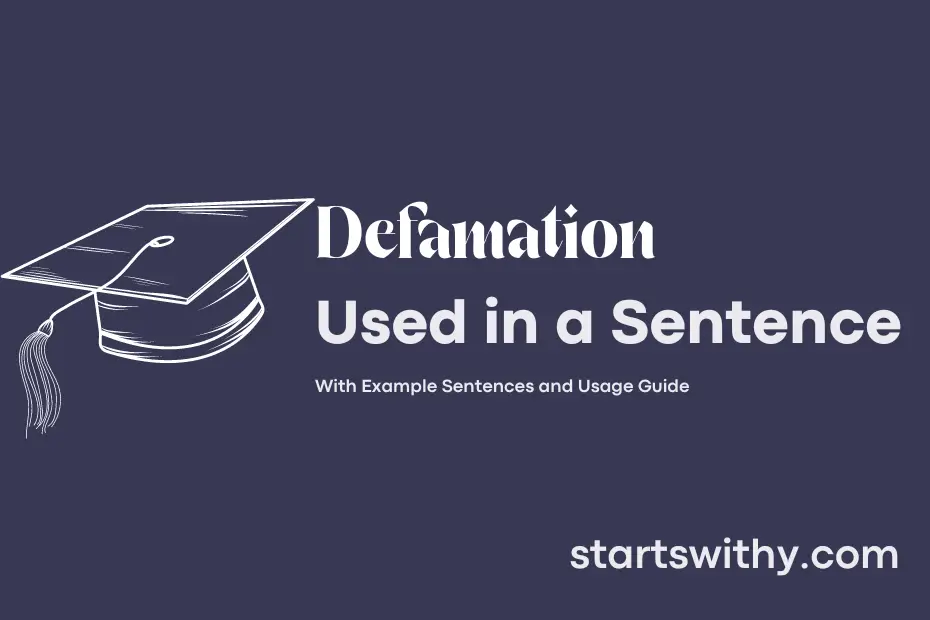Have you ever heard of the term “defamation”? Defamation refers to the act of damaging someone’s reputation through false statements that are communicated to others. It can take the form of slander when spoken, or libel when written.
This legal concept aims to protect individuals from the harmful consequences of untrue and damaging information being spread about them. Defamation laws vary by jurisdiction, but generally require that the statement is false, presented as a fact, and causes harm to the person’s reputation. Understanding defamation is crucial in navigating the consequences of spreading false information about others.
7 Examples Of Defamation Used In a Sentence For Kids
- Defamation is saying mean things about others.
- When we spread lies about someone, it is called defamation.
- It’s important to always tell the truth and not engage in defamation.
- Hurting someone’s reputation is called defamation.
- We should always be kind and avoid defamation.
- Defamation can make someone feel sad or angry.
- Let’s remember to always speak nicely and avoid defamation.
14 Sentences with Defamation Examples
- Defamation can have serious consequences, including legal action and damage to one’s reputation.
- It is important for college students to be aware of the laws regarding defamation and how to avoid making false statements.
- Posting harmful rumors or lies about someone online can be considered an act of defamation.
- Students should think twice before sharing information that could potentially lead to defamation of individuals or organizations.
- Writing an article filled with false accusations can result in a defamation lawsuit.
- Gossiping about professors or classmates without evidence could lead to accusations of defamation.
- Being cautious with what you share on social media can help prevent instances of defamation.
- Engaging in defamation can harm not only the person being targeted but also the person spreading false information.
- When writing research papers, it is crucial to avoid making claims that could lead to accusations of defamation.
- Spreading rumors about a student’s academic performance without evidence can be considered an act of defamation.
- Easy access to social media platforms today increases the likelihood of defamation occurring between college students.
- Engaging in discussions with classmates about controversial topics should be done with care to avoid potential claims of defamation.
- It is unethical for students to engage in activities that could lead to defamation of their peers or professors.
- Understanding the difference between freedom of speech and defamation is essential for responsible communication in an academic setting.
How To Use Defamation in Sentences?
Defamation can be utilized in a sentence to accuse someone of harming another person’s reputation by spreading false information. For example, “The celebrity sued the magazine for defamation after they published an untrue story about her involvement in a scandal.”
To properly incorporate the word defamation in a sentence, it is important to ensure that the statement is clear, concise, and contextually relevant. One should be mindful not to make any false claims that could damage someone’s reputation unjustly.
When constructing a sentence with the word defamation, it is advisable to have a good understanding of its meaning and usage. This will help in forming a sentence that accurately conveys the intended message without causing any confusion or misunderstanding.
Remember that defamation involves making harmful statements about someone that are not true. It is essential to provide evidence or clarify that the information being shared is factual to avoid legal repercussions for making false claims.
In conclusion, using defamation in a sentence requires careful consideration of the implications of the statement being made. By following these guidelines, one can effectively incorporate the word defamation in a sentence while upholding integrity and honesty in communication.
Conclusion
In conclusion, defamatory statements can have serious consequences as they entail making false and damaging claims about an individual or entity. Such statements can harm a person’s reputation, causing emotional distress and financial implications. It is crucial to exercise caution when making assertions about others to avoid potential legal repercussions associated with defamation.
When considering defamation, it is important to be mindful of the impact these statements can have on the lives of those targeted. Understanding the legal ramifications and ethical implications of spreading false information is essential in maintaining trust and integrity in communication. Ultimately, preventing the spread of defamatory statements contributes to a more respectful and responsible discourse in society.



